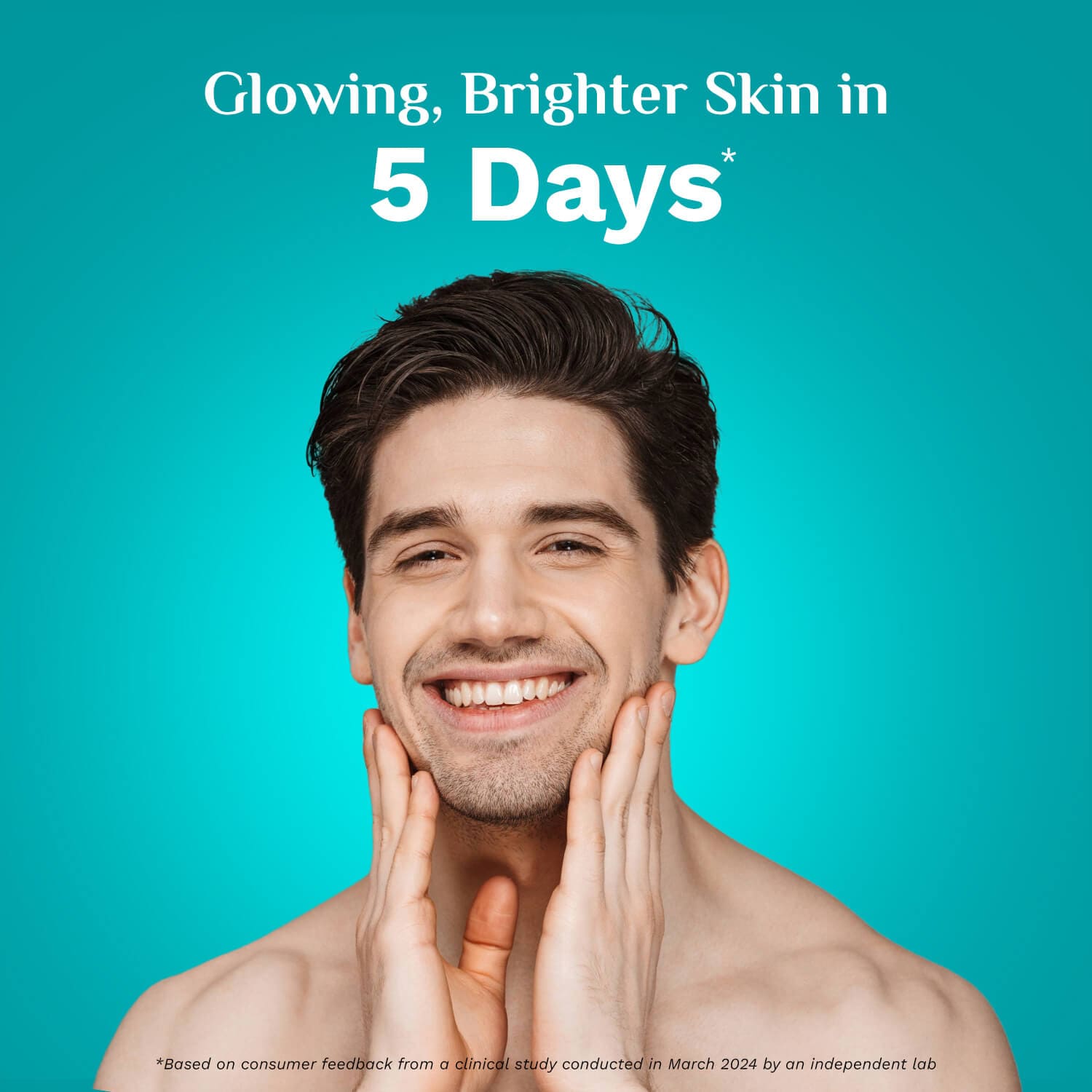
10 Reasons Why Your Skin Is Getting Darker
Skin darkening without sun exposure? It's not just you. Many people notice this change and worry. Skincare buffs find it especially confusing. But don't fret – your complexion can shift for various reasons. Sun isn't always the culprit. Understanding these factors can help solve the mystery of your changing skin tone.

In this blog post, we will explore the various causes of skin darkening and how you can address them. So, if you're wondering, "Why is my skin getting darker without sun?" or "Why is my face getting darker without sun?"—you're in the right place.
1. Hormonal Changes
Skin darkening often stems from hormonal shifts. Pregnancy, birth control, and thyroid problems can disrupt the delicate balance. These changes may spur excess melanin production, the pigment responsible for skin colour. As hormone levels fluctuate, melanin output rises, leading to darker skin tones. Pregnant women frequently experience this phenomenon. Elevated oestrogen can spark melasma, colloquially dubbed the "mask of pregnancy." This temporary darkening typically fades post-pregnancy, but other hormonal imbalances may require medical intervention to resolve.
Melasma causes dark patches on the face, especially on the cheeks, forehead, and upper lip. It's more common in women, but men can get it, too. If you’ve been asking yourself, "Why is my skin becoming darker?" and have noticed that the darkening is particularly prominent on your face, hormonal changes might be the cause.
2. Post-Inflammatory Hyperpigmentation (PIH)
Skin damage triggers a chain reaction. Acne, eczema, or cuts first inflame the skin. As healing begins, melanin production surges. This excess pigment leaves behind dark patches - post-inflammatory hyperpigmentation (PIH). While PIH can affect anyone, darker skin tones face greater challenges. Their naturally higher melanin levels amplify the effect, making marks more noticeable. Thus, skin colour directly influences PIH visibility and persistence after initial healing occurs.
PIH is one of the main answers to "why skin becomes dark" after skin trauma. It can occur anywhere on the body. But it's common on the face, neck, and hands. If you’ve experienced a breakout, allergic reaction, or even an aggressive skincare treatment recently, it might explain "why your skin is becoming darker without sun exposure."
3. Medications
Skin darkening, or drug-induced hyperpigmentation, can occur from certain medications. Antibiotics, anti-seizure drugs, and chemotherapy agents are common culprits. These changes may appear as widespread patches or in specific areas on the face and body. Some drugs also increase sun sensitivity, potentially worsening the effect. If you notice skin tone changes after starting a new medication, it could be the source. Consider this possibility and consult your healthcare provider for guidance.
4. Ageing and Sun Damage
Ageing can also be a factor in skin darkening, though it might seem contradictory to ask, "Why is my skin getting darker without sun exposure?" Past sun exposure shapes future skin health. Years of UV rays accumulate, altering skin colour even without current sunbathing. As we age, our skin's recovery slows, leading to dark spots on previously exposed areas. Face, hands, and arms often reveal this solar history. While today's habits matter, yesterday's sun damage can emerge unexpectedly.
For sun damage, try Pilgrim's Peeling Solution. It contains 25% AHA, 2% BHA, and 5% PHA. This solution gently removes dead skin, revealing fresh skin below. Always patch tests first. Its key ingredients are Glycolic, Salicylic, and Lactic Acids. These improve skin texture and tone, reducing pores and discolouration. Aloe and Hyaluronic Acid make the skin brighter and more radiant.
5. Skin Conditions (Acanthosis Nigricans)
Some skin conditions can cause darkening. For instance, acanthosis nigricans leads to dark, thick patches. These often appear in folds of skin, like the neck, underarms, and groyne. This condition is linked to insulin resistance, obesity, or hormonal issues, such as polycystic ovary syndrome (PCOS). It can also signal deeper health problems, like diabetes. So, if you notice darkening in these areas, it's crucial to see a healthcare provider.
This skin darkening is distinct. It often appears as velvety or rough patches, not the typical flat hyperpigmentation seen in other conditions. If you’re wondering "why skin becomes dark" in such specific areas, a medical evaluation may be necessary.
6. Hyperpigmentation from Skincare Products
Ironically, certain skincare products meant to brighten can darken your complexion. Hydroquinone, retinoids, and potent acids may trigger irritation or allergies, potentially causing ochronosis. This condition paradoxically darkens skin, most visibly on the face, undermining the very purpose of skin-lightening treatments. Users should exercise caution with such ingredients to avoid unintended consequences.
Ochronosis often happens from incorrect use of products. For example, using high-concentration hydroquinone for too long. If you’ve recently introduced new products into your skincare routine, and you’re asking, "Why is my face getting darker without sun?"—take a close look at your product labels. It may be time to consult a dermatologist about any potential irritants.
7. Nutrient Deficiencies
A lack of key nutrients can darken the skin. Deficiencies in vitamins B12, D, and folic acid are linked to this. Specifically, low B12 can cause dark patches, especially in those with darker skin.
If your diet has been lacking in key nutrients, this could explain "why is my skin getting darker without sun." Consider adding B12-rich foods, like fish, eggs, and fortified cereals. Or, ask your doctor about supplements.
8. Stress
Stress darkens skin unexpectedly. Cortisol, released during stress, alters melanin production. This hormone's excess can subtly darken facial skin over time. Prolonged stress may lead to uneven pigmentation. To combat these effects, try mindfulness practices, regular exercise, or seek therapy. Managing stress not only improves mental health but also maintains your natural skin tone. Awareness of this connection empowers you to protect your complexion through stress reduction techniques.
9. Underlying Health Conditions
Sometimes, skin darkening signals a serious health issue. For example, Addison's disease, which impacts the adrenal glands, can darken skin. This condition boosts melanin production, leading to hyperpigmentation. It often affects areas like elbows, knees, and skin creases.
Other issues, such as liver disease, can alter skin colour. If you see a big change in your skin, especially in covered areas, consider seeing a doctor. This helps rule out serious health problems.
10. Environmental Factors
Pollution and environmental factors can darken the skin. Pollution particles enter the skin, causing inflammation. This triggers melanin production, leading to dark patches over time. It also dulls the complexion. In polluted cities, cleansing skin and using protective products are crucial.
Conclusion
If you've been wondering, "Why is my skin becoming darker?" without obvious sun exposure, it's essential to understand that several factors could be at play. Your skin can react to many triggers, both internal and external. These include hormonal changes, medications, ageing, and stress.
Many skin conditions are treatable with proper care. You can improve your skincare routine, address hormonal issues, and manage health problems to restore your skin's glow. Meanwhile, use a high-quality peeling solution and apply sunscreen to protect your skin when you go out in harsh sunlight. Your skin is the protective and most essential organ. Caring for it benefits you in the long run.






